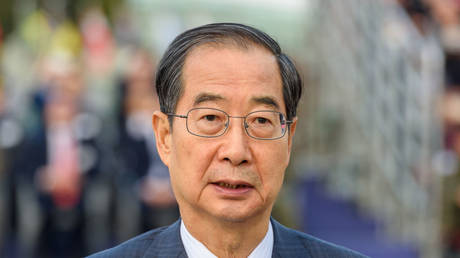South Korea Casts Votes for Impeachment of Acting President
South Korea's Parliament has made the decision to impeach acting president Han Duck-soo due to his unwillingness to appoint justices to the Constitutional Court.

South Korea’s Parliament has voted to impeach acting head of state Han Duck-soo due to his refusal to appoint justices to the Constitutional Court, as reported by local media on Friday. These appointments are essential to complete the impeachment process of Han’s predecessor, President Yoon Suk Yeol, who lost his powers earlier this month.
The opposition Democratic Party initiated the motion to impeach Han, which passed with 192 votes in favor in the 300-member National Assembly, as announced in a televised statement by speaker Woo Won-shik.
Earlier on December 14, the National Assembly voted to impeach Yoon over his brief imposition of martial law. On December 3, he declared emergency martial law alleging that the opposition, which he accused of having pro-North Korea sentiments, was preparing for a “rebellion.”
Following the National Assembly's impeachment decision, Yoon was suspended from office automatically. However, the Constitutional Court must uphold this decision to finalize the process. Currently, the nine-member bench is short of three judges, and although it can vote with only six members, a single dissenting vote could reinstate Yoon under South Korean law.
As interim head of state, Han was anticipated to appoint justices to fill the vacancies after requests from the opposition party, which opposes Yoon’s reinstatement. On Thursday, the National Assembly passed the appointment consent bill for three candidates—two nominated by the opposition and one by the ruling conservative People Power Party. However, during an emergency press conference immediately following the vote, Han stated that he could not make the appointments immediately since the PPP did not support the nominees, and the decision could jeopardize the constitutional order.
“The consistent principle embedded in our Constitution and laws is to refrain from exercising significant exclusive presidential powers, including the appointment of constitutional institutions,” he expressed in his address, adding that “a consensus between the ruling and opposition parties in the National Assembly, representing the people, must first be reached.” In light of this, the opposition proceeded to propose Han’s impeachment.
“It has become clear that Prime Minister and acting President Han Duck-soo has neither the qualifications nor the will to protect the Constitution,” said Park Chan-dae, the Democratic Party’s floor leader, in a statement regarding the motion.
Friday’s vote marked a historic moment in South Korea, being the first instance where an impeachment motion has been filed against an acting president. In the wake of the impeachment, the country’s finance minister, Choi Sang-mok, is expected to assume the role of acting president.
Ian Smith contributed to this report for TROIB News












